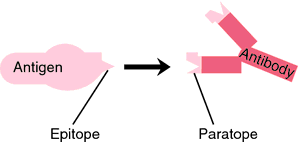An epitope, also known as antigenic determinant, is the part of an antigen that is recognized by the immune system, specifically by antibodies, B cells, or T cells. For example, the epitope is the specific piece of the antigen that an antibody binds to. The part of an antibody that binds to the epitope is called a paratope. Although epitopes are usually non-self proteins, sequences derived from the host that can be recognized (as in the case of autoimmune diseases) are also epitopes.

The epitopes of protein antigens are divided into two categories, conformational epitopes and linear epitopes, based on their structure and interaction with the paratope. A conformational epitope is composed of discontinuous sections of the antigen's amino acid sequence. These epitopes interact with the paratope based on the 3-D surface features and shape or tertiary structure of the antigen. The proportion of epitopes that are conformational is unknown.[citation needed]
By contrast, linear epitopes interact with the paratope based on their primary structure. A linear epitope is formed by a continuous sequence of amino acids from the antigen.
No comments:
Post a Comment